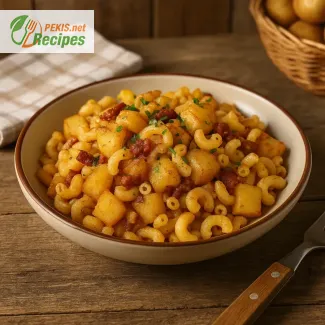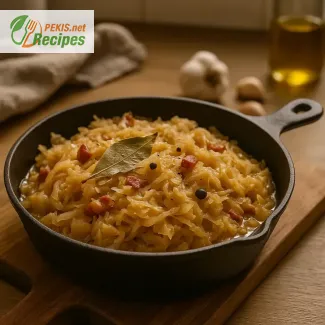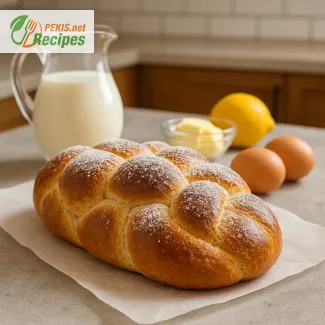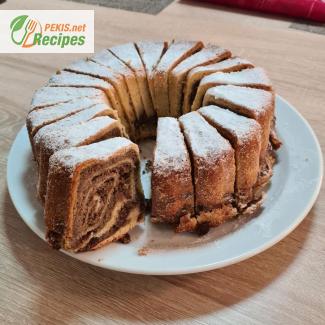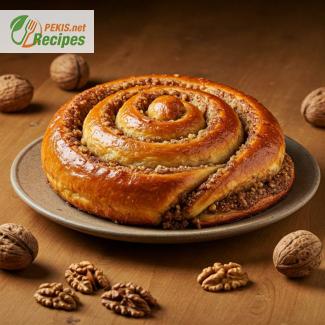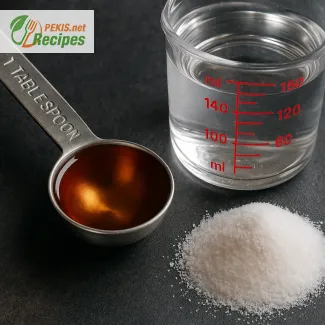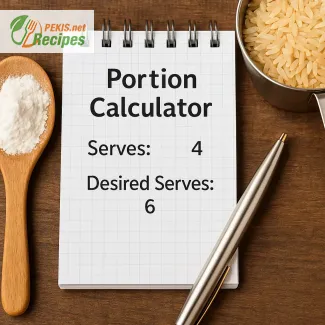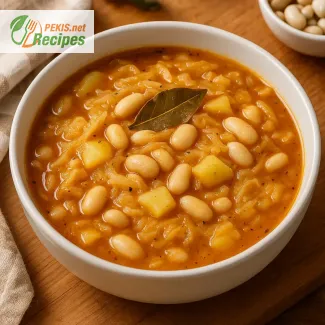
Discover the rich heritage of Jota: Slovenia’s sauerkraut and bean stew
A timeless comfort dish rooted in Alpine tradition
Slovenian Jota is a rustic, hearty stew that traces its roots deep into the Alpine and Karst regions of Slovenia, where resourceful cooking and seasonal ingredients gave birth to enduring classics. This dish is more than just a simple meal—it is a reflection of Slovenia’s cultural fusion between Central Europe, the Balkans, and the Mediterranean. With a base of fermented cabbage (sauerkraut) and creamy beans, Jota is beloved for its robust flavors, nourishing qualities, and adaptability across regional kitchens.
What sets Jota apart is its balance of sour, earthy, and smoky elements, brought together with minimal ingredients yet elevated through traditional preparation. Often served during colder months, this stew embodies the spirit of winter cuisine, offering warmth, depth, and satisfaction in every spoonful. Whether served at rustic mountain inns or in modern urban kitchens, Jota with sauerkraut and beans remains a beloved Slovenian staple that invites curiosity from food lovers around the world.
The origins of Jota: regional identity through ingredients
Karst, Goriška Brda, and the Julian Alps define the soul of this stew
The story of Jota is tightly intertwined with the Karst plateau and the western regions of Slovenia, where preservation methods like fermentation and drying were essential for culinary survival. In this setting, sauerkraut was more than a garnish—it was a fundamental element of the local diet, valued for its long shelf life and sharp flavor. Beans, cultivated in Slovenian valleys and commonly dried for winter, provided protein and creaminess. Together, they form the foundation of Slovenia’s most iconic stew.
Some regional variations include dried pork ribs, smoked sausage, or pancetta, which add a depth of umami to the base. In coastal areas near Italy, olive oil may be used instead of lard, giving the dish a lighter Mediterranean twist. In mountainous villages, the stew is often paired with dense rye or sourdough bread, a nod to the local grain traditions.
Key components that define authentic Slovenian Jota
Simplicity meets deep flavor in every layer
At its core, traditional Jota relies on a few carefully selected ingredients:
- Sauerkraut: fermented cabbage adds tang and texture
- Cooked beans: most often cannellini or borlotti, they contribute creaminess
- Potatoes: diced and simmered until tender, they provide body to the stew
- Onion and garlic: gently sautéed to form the flavor base
- Bay leaves and black pepper: for a subtle herbal note
- Fat: traditionally pork fat or smoked meat, though plant-based oils are now common in vegetarian versions
Some recipes include a light roux to thicken the stew, made with flour and oil, which enhances mouthfeel and brings cohesion to the dish. The magic lies in the slow simmering process, allowing each component to infuse the broth with its distinct essence.
Why Jota remains relevant in modern kitchens
Plant-based options and ancestral eating trends boost its appeal
With the rise of whole-food comfort cooking, Jota’s simplicity and wholesomeness have earned it a place in modern plant-based diets. Swapping meat for extra legumes or smoked paprika retains the flavor depth while making the dish fully vegetarian or vegan. Moreover, its reliance on fermented cabbage and legumes fits naturally into today’s conversations around gut health, sustainable eating, and ancestral food practices.
Chefs and home cooks alike appreciate Jota’s flexibility. It can be prepared in large batches for family meals, frozen for future use, or served as a starter or main depending on the occasion. Its adaptability makes it a perfect candidate for weeknight cooking as well as festive gatherings, especially during autumn and winter seasons.
Culinary context and comparison with other stews
What makes Jota different from Eastern European soups and Mediterranean broths
While similar dishes exist in Eastern Europe—like Polish kapuśniak or Hungarian bean goulash—Jota distinguishes itself through its texture, herb balance, and use of local Slovenian ingredients. It is neither too acidic nor overly rich, but strikes a pleasant equilibrium. It’s heartier than a Mediterranean minestrone and more refined than typical peasant soups due to its regional finesse and thoughtful layering of flavors.
Jota’s position in Slovenian cuisine is akin to cassoulet in France or minestrone in Italy—a symbol of place, people, and preservation. It’s a recipe passed down generations, often slightly altered but always respected for its origins.
Cooking tips for the perfect Jota every time
From stovetop to slow cooker: enhance the depth with small tweaks
To master Jota at home, consider these suggestions:
- Use homemade or high-quality sauerkraut with visible strands and moderate acidity
- Rinse and soak beans overnight, or use canned beans for convenience (rinse well)
- Let the stew rest for several hours or overnight after cooking to enhance flavor
- Add a touch of smoked salt or paprika if skipping the meat
- Reheat gently the next day—it often tastes even better after the flavors meld
Jota is typically served warm, garnished with a drizzle of olive oil, a crack of black pepper, or even a spoonful of sour cream in some modern variations. It pairs beautifully with dark rye bread or buckwheat porridge, offering contrast and nutritional depth.
Jota in Slovenian culture: beyond just food
A dish of memory, community, and celebration
More than just a stew, Jota is part of Slovenia’s culinary identity, commonly found at festivals, family gatherings, and local inns. It’s a meal that evokes nostalgia—bringing to mind a grandmother’s kitchen, a snowy afternoon, or the communal rhythm of slow food. For Slovenians abroad, it remains a cherished link to their heritage, often passed on through handwritten recipe books and oral tradition.
As the global palate becomes more adventurous, Slovenian Jota with sauerkraut and beans is emerging from obscurity to take its rightful place among Europe’s great regional stews—humble yet unforgettable.
- In a large pot, heat the oil or pork fat over medium heat. Add the onion and sauté until translucent, about 5 minutes.
- Stir in the garlic and cook for another 1–2 minutes.
- Add the flour and stir continuously to form a light roux, cooking for about 2 minutes to remove the raw flour taste.
- Pour in the water or vegetable broth, whisking to avoid lumps.
- Add the diced potatoes, bay leaf, and sauerkraut. Bring to a gentle boil, then reduce the heat to low.
- Simmer for 25 minutes, or until the potatoes are tender.
- Add the cooked beans, salt, pepper, and smoked paprika (if using). Continue to simmer for another 10–15 minutes, allowing all flavors to combine.
- Remove the bay leaf, taste and adjust seasoning if needed. Let rest 5–10 minutes before serving.
Enhancing the Flavor and Texture of Slovenian Jota
Practical ways to modernize and refine this rustic stew
While Slovenian Jota is revered for its simplicity and traditional balance of flavors, there's always room for subtle innovation that respects its heritage. By adjusting ingredients or refining cooking techniques, home cooks can enhance the stew’s depth, texture, and nutritional value. Understanding how each component interacts in the cooking process can transform this already comforting dish into an elevated, homemade culinary experience that feels both authentic and tailored.
Using better sauerkraut for a cleaner, tangier profile
Choose raw, unpasteurized kraut for superior results
The most impactful upgrade starts with the sauerkraut. Most store-bought versions are pasteurized and heavily salted, which can create a flat or overly briny flavor. Using raw, fermented sauerkraut that contains live cultures offers a more nuanced tang, natural crunch, and digestive benefits. If the sauerkraut is too sour for your taste, rinse it gently but avoid over-washing, which removes beneficial lactic acids and dulls the complexity. For a milder dish, combine half sauerkraut and half shredded white cabbage, balancing acidity with sweetness.
Exploring bean varieties for richer texture
Not all beans are created equal
Borlotti, cannellini, and butter beans each bring a distinct creaminess and absorb flavors differently. Borlotti beans add a nutty note, while butter beans give a velvety, almost luxurious texture. If using canned beans, ensure they are rinsed thoroughly to avoid metallic or overly salty notes. For optimal flavor, soak dried beans overnight and cook them with aromatics like garlic or bay leaf before incorporating them into the stew. This adds dimension and reduces the need for extra seasoning later.
Replacing fat sources without sacrificing depth
From traditional pork fat to vegetarian-friendly richness
Traditional Jota includes pork fat, bacon, or pancetta, which lend smokiness and body. However, for a lighter or vegetarian variation, substitute with cold-pressed sunflower oil, smoked olive oil, or even a dollop of roasted garlic purée. A small amount of smoked paprika can replicate the earthy depth of meat without the cholesterol or heaviness. These adaptations not only maintain the flavor intensity but also cater to modern dietary needs.
Adding aromatics and spices for complexity
From bay leaf to caraway seeds – small additions, big results
While traditional Jota is modestly seasoned, adding subtle herbal or spice accents can enrich the profile. A pinch of caraway seeds blends beautifully with sauerkraut, lending a gentle bitterness that balances the tang. A sprig of fresh thyme, a few juniper berries, or a hint of smoked chili can bring unexpected complexity without overpowering the stew’s identity. Just remember: less is more—these should support, not dominate.
The role of potatoes in consistency and mouthfeel
Choosing the right variety makes a difference
Starchy potatoes, such as Russet or Maris Piper, break down slightly during cooking, naturally thickening the stew. For a chunkier consistency, go for waxy potatoes like Yukon Gold or Charlotte. Some cooks like to mash a few pieces against the side of the pot during the simmering process to increase creaminess. Avoid overcooking, which can result in mushy or indistinct texture.
Common mistakes to avoid when preparing Jota
What can ruin the balance of this dish
- Over-rinsing sauerkraut: dulls the sour note and removes character
- Overcooking beans: leads to a mushy, grainy texture
- Heavy seasoning: too much salt or smoked meat can overwhelm other ingredients
- Using broth cubes: can add artificial flavor and excessive sodium
- Skipping resting time: Jota improves dramatically when left to rest for at least 1 hour after cooking
Letting the stew sit allows all components to harmonize and deepen. For best results, prepare it a day ahead and reheat slowly.
Nutritional upgrades and whole-food alternatives
Making Jota better for your body without losing tradition
For a cleaner nutritional profile, replace the roux (flour and fat thickener) with a bean purée or a few mashed potato chunks. If using oil, opt for extra virgin olive oil, which contains antioxidants and healthy fats. Reduce sodium by choosing low-salt sauerkraut or making your own. Adding chopped kale, turnip greens, or celery root can increase the fiber and vitamin content without altering the soul of the dish.
Why homemade Jota is always superior
The advantage of fresh, controlled cooking
Homemade Jota allows control over every element: sodium, texture, fat content, and even fermentation quality. It avoids industrial preservatives and enables the cook to fine-tune sourness, thickness, and seasoning. It’s also more satisfying to prepare, as it evokes culinary heritage and offers space for creativity. Whether slow-cooked on the stove or prepared in a pressure cooker for convenience, crafting Jota at home invites mindfulness and connection to tradition.
Allergens present in the recipe:
- Gluten (from all-purpose flour)
Suggestions to eliminate allergens and gluten:
- Replace all-purpose flour with gluten-free flour (like rice flour or cornstarch)
- Ensure broth and sauerkraut are certified gluten-free
- Use olive oil or certified allergen-free oils instead of animal fat if allergic to pork
Vitamins and minerals per serving (approximate):
- Vitamin C: 25 mg – supports immune function and collagen production
- Vitamin B6: 0.4 mg – supports brain health and metabolism
- Folate: 90 mcg – essential for red blood cell formation and fetal development
- Potassium: 670 mg – maintains proper heart and muscle function
- Iron: 2.5 mg – supports oxygen transport and energy metabolism
- Magnesium: 45 mg – helps regulate muscle and nerve function
Antioxidants per serving (approximate):
- Quercetin (from onion and sauerkraut): 9 mg – anti-inflammatory and supports cardiovascular health
- Lactic acid bacteria (from sauerkraut): active cultures – promote gut health and improve digestion
- Phenolic acids (from beans): 15–20 mg – reduce oxidative stress and support cellular health

